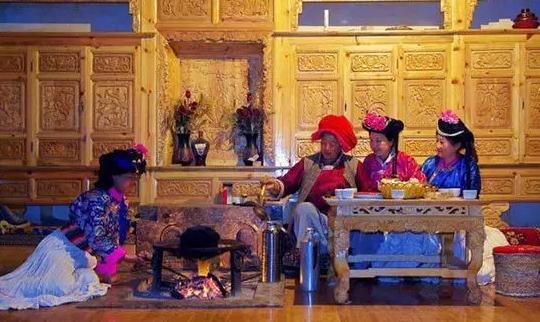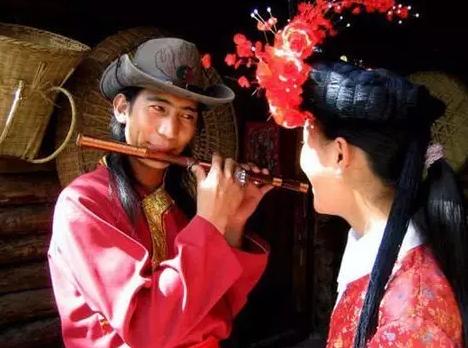当前位置: Language Tips> 专栏作家> 老外在中国
想象我们生活在一个母系社会:那里女人才是主宰。土地归女人所有,并由女儿继承。没有婚姻,更没有一夫一妻制。在云南省丽江市泸沽湖畔就有这样一个部落。

By Rose Bolger
Imagine living in a matriarchal society where women make the important decisions, own and pass on land to their daughters and do not practice marriage or monogamy.
想象我们生活在一个母系社会:那里女人才是主宰。土地归女人所有,并由女儿继承。没有婚姻,更没有一夫一妻制。
That's what Choo Waihong, a corporate lawyer from Singapore, did for six years, off and on, after building a house among the Mosuo people in Yunnan province.
来自新加坡的企业律师朱伟鸿在云南摩梭部落里安了家,此后6年,她隔三差五地住在那里,就过着这样的生活。
Most curious tourists spend more time getting to the Mosuo's home around Lugu Lake, a 7-9 hour drive from Lijiang, than they spend visiting. But that wasn't enough for Choo. She made it her second home, even becoming the god mother of a young Mosuo girl.
好奇的游客们大多从丽江开车前往泸沽湖的摩梭人家。路上要耗时七到九个小时,比他们参观的时间还长。但是朱伟鸿并不满足于此。她在那里建了第二个家,甚至做了一位摩梭小女孩的教母。
While there have been documentaries and anthropological studies of the Mosuo tribe, no outsider has spent that much time simply being there and observing their lifestyle.
人们拍摄过关于摩梭部落的纪录片,发表过相关的人类学研究报告,但没有一个外地人曾在那里生活这么长的时间,观察她们的生活方式。

She's written a book, The Kingdom of Women, and spoke recently at The Bookworm in Beijing. Often at the end of these sorts of talk, there's an awkward few moments where no one's brave enough in the audience to ask the first question. Not this time. About 20 hands shot up as Choo wrapped up. Clearly, a lot of people were having trouble imagining a society where the power imbalance is flipped.
她写了一本书,名为《女儿国》,最近还在北京的“老书虫”书店作了演讲。通常这类演讲结束时,总会出现一些很尴尬的时刻,因为观众们谁也不敢第一个发问。但这次与以往不同。当朱伟鸿结束演讲时,大约有20人举手提问。很明显,很多人无法想象这样一个权力颠倒的社会。
There was, of course, a lot of interest in the concept of the "walking marriage" that Mosuo people practice. Women may invite a man over at night time, but they must walk home by sunrise. The resulting children are raised in the mother's house, while the fathers remain living at their own mother's house.
当然,很多人对摩梭人奉行的“走婚”理念很感兴趣。夜里女人可能会邀请男人来家居住,但是他们必须在日出之前走回自己的家。生下的孩子归母家抚养,而孩子的父亲仍住在自己的母亲家里。
Interestingly, many of the questions about this matriarchal culture were about the men. Were they content with their second rate position? Have they ever rebelled? Did they do the cooking?
有趣的是,众多有关母系文化的问题都是围绕男性的。比如,他们对自己的二等地位满意吗?他们反抗过吗?他们也做饭吗?
No was Choo's answer to all three. Not surprisingly, she hadn't spent too much time worrying about how the men were faring. But from her observations she believes that they were happy enough to be free of responsibilities. They enjoy the benefits of the walking marriage as much as the women and tend to "strut around like peacocks" to attract the attention of the women.
朱伟鸿对这三个问题的回答都是“不”。不出意料,她没花太多时间担心这些男人过得如何。但据她的观察,她相信他们很高兴自己可以不受责任之累。他们和女性一样享受走婚带来的好处,努力“像孔雀一样自我炫耀”来吸引女性的注意。

I'm skeptical that anyone, male or female, would be happier with a lower status based on their gender. Hence, women stood up to discrimination and continue to fight for equality. Why the Mosuo men have apparently not done that, even with a physical advantage, is interesting.
我认为任何人,不论男女,都不会乐意接受因性别而低人一等。因此,女性勇于面对歧视,并一直为平等奋斗。令人感兴趣的是,为什么摩梭男性在即使拥有生理优势的情况下,却明显没有为此奋斗。
Choo noted obvious benefits for the ruling women like confidence, independence and healthy self-esteem. Qualities that are still often hard fought for in patriarchal societies.
朱伟鸿指出了女性处于统治地位时的明显好处,比如自信、独立和健康的自尊。在父权社会中,这些品质仍是难以争取的。
Perhaps more intriguing is not the differences, but similarities between the traditional gender roles in Mosuo culture and patriarchal societies. Women may hold the power, but they still do the majority of cooking and cleaning, while the men are tasked with the physical labor. There is evidence that boys help raise their younger siblings, but women remain the primary carers. Why women still assume the domestic duties even as head of the household is another mystery.
也许最有趣的不是传统性别角色在摩梭文化和父权社会中的差异,而是他们的相似之处。女性可能会掌权,但是她们仍然承担着大部分的做饭和清洁工作。而男性还是从事体力劳动。有证据表明,男孩们可以帮助抚养他们的弟弟妹妹,但女性仍是主要的抚养人。为什么女性已是一家之主了,却仍要承担家务?这就变成了另一个谜题。
Even with Choo's special insight, she does not pretend to have all the answers. Rather her account is important because it raises these questions about the Mosuos and, in turn, encourages us to scrutinize and challenge our own way of doing things and society's treatment of men and women.
即使朱伟鸿有着自己的独特见解,她也没有假装自己能解释所有问题。但她讲述的东西很重要。因为人们因此对摩梭人产生了疑问,相应地,这些故事还鼓励我们审视和挑战我们自己做事的方式,以及男人女人在社会中的待遇问题。
英文来源:“CHINA DAILY”微信公众号
翻译:曲金遥(中国日报网iNews译者)
编审:丹妮 董静
音频编辑:焦洁
更多内容请关注“CHINA DAILY”微信公众号:

Broadcaster

Rose Bolger joined China Daily at the start of November 2016 as a copy editor at the website. Having left her home in the small Australian city, Hobart, to move to one of the biggest cities in the world, she's looking forward to exploring Beijing. During her 10-year career as a journalist she has worked for newspapers, radio and television networks.
上一篇 : 老外在中国:低头一秒,家毁人亡!
下一篇 :
关注和订阅

电话:8610-84883645
传真:8610-84883500
Email: languagetips@chinadaily.com.cn